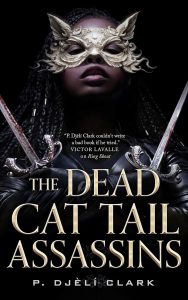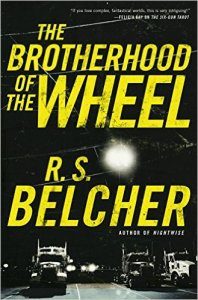Gary K. Wolfe Reviews The Dead Cat Tail Assassins by P. Djèlí Clark
 The Dead Cat Tail Assassins, P. Djèlí Clark (Tordotcom 978-1-25076-704-2, $20.99, 224pp, hc) April 2024.
The Dead Cat Tail Assassins, P. Djèlí Clark (Tordotcom 978-1-25076-704-2, $20.99, 224pp, hc) April 2024.
Like Chekhov’s famous gun, it seems to be an unstated principle among writers as diverse as Robert Ludlum and Octavia E. Butler that a character suffering from total amnesia in the first act is in for some world-shaking revelations by the third. The same is true of P. Djèlí Clark’s The Dead Cat Tail Assassins, but while a few familiar mystery elements help propel Clark’s fast-moving plot, his setting and characters are entirely his own. For one thing, the central figure Eveen, is dead. Resurrected by an assassin’s guild as a result of an agreement made in life – though she retains no memories from that life–she now serves the goddess Aeril as part of a professional team calling themselves the Dead Cat Tail Assassins. While their rules are pretty rigid for carrying out contract killings – or ‘‘shipping,’’ as they call it – Eveen has earned the nickname Eviscerator because of a particular violent killing of a child murderer. Like a good noir protagonist, she tends to stretch the rules, is quick with cynical wisecracks, and is a bit too blithe about violence and even torture to be entirely sympathetic. Her new assignment, though, leads to some revelations that test her loyalty to her guild and her rather fearsome goddess.
Since one of the major plot turns comes rather early in the story, it might be prudent to just skip ahead to the main mystery, which involves Eveen and a handful of allies, including her friend and handler Fennis and a somewhat disoriented younger woman named Sky, to discover who is really behind Eveen’s latest (and distinctly problematical) assignment, and why. This leads them through an escalating series of discoveries and confrontations, some even involving timeslips and a version of the grandfather paradox, which begin to expose some deep secrets of Tal Abisi, the bustling, crime-ridden port city which serves not only as the setting, but very nearly as a character in itself. The city is celebrating its annual Festival of the Clockwork King, and the richness of detail that Clark provides gives the whole thing something of the flavor of a hardboiled mystery set in New Orleans during Mardi Gras – the distractions of the city and the festival inevitably complicate the investigation but are so fascinating in their own right that many readers might be hoping for more Tal Abisi in future stories.
But Clark is adept at balancing his central mystery with quirky character development and enough witty details to suggest that Tal Abisi has its own versions of science and pop culture. Action at a distance is referred to as ‘‘quantum thaumaturgy,’’ and Eveen is enamored of an awful series of potboiler adventure novels about Asheel the Maniac Hunter. In short, Tal Abisi is far more textured than a generic fantasy stage setting, just as Eveen is far more complex than most of those lurking assassins who have become nearly an archetype of fantasy novels and games. Prickly as she may be, we end up thinking we’d like to know about her (just as she’d like to know more about herself), and to spend a bit more time exploring the colorful mean streets of Tal Abisi.
This review and more like it in the March 2024 issue of Locus.
 While you are here, please take a moment to support Locus with a one-time or recurring donation. We rely on reader donations to keep the magazine and site going, and would like to keep the site paywall free, but WE NEED YOUR FINANCIAL SUPPORT to continue quality coverage of the science fiction and fantasy field.
While you are here, please take a moment to support Locus with a one-time or recurring donation. We rely on reader donations to keep the magazine and site going, and would like to keep the site paywall free, but WE NEED YOUR FINANCIAL SUPPORT to continue quality coverage of the science fiction and fantasy field.
©Locus Magazine. Copyrighted material may not be republished without permission of LSFF.







